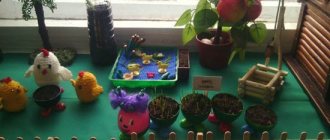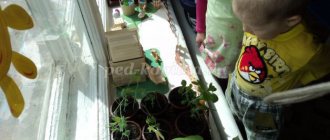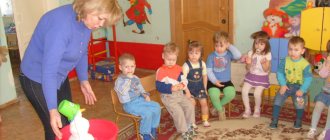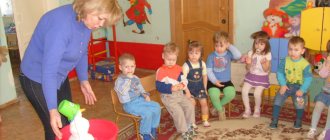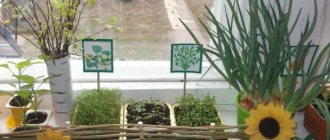Project for the preparatory group “Vegetable garden on the windowsill”
Project for the preparatory group
"Garden on the windowsill"
(the project is designed for 7 weeks)
Project participants
: children of the preparatory group, teacher, parents.
Project type
: practical
Content section:
cognitive and research activities.
By number of participants
: group.
By time:
long-term.
Information sources:
methodological literature, Internet resources.
RELEVANCE.
Winter is ending. The sun is getting higher and higher every day, and the days are getting longer and warmer. It's time to plant. Vegetable gardening on a windowsill in a kindergarten is a very pleasant activity, especially in winter and spring, when you want not only to taste the fresh gifts of nature, but also to look at the colors of greenery or tomatoes. But there is nothing more pleasant than the first greenery of spring, which pleases the children right in the group room on the windowsill. It can be onions, parsley, dill, and even lettuce. A vegetable garden on a windowsill is a great way to dispel the seasonal longing for natural colors and warmth. Expanding children's ideas about how to care for plants indoors, generalizing ideas about the need for light, heat, soil moisture for plant growth, and developing children's cognitive and creative abilities.
Target:
To generalize and expand children’s knowledge of how to care for plants indoors; involve parents in co-creation.
Tasks:
1. Teach children to care for plants indoors.
2. To form in children the concept of the relationship between nature and people: people plant, grow and care for plants, plants grow, delight people with their beauty, and feed them with their fruits.
3. Summarize children’s ideas about the need for light, heat, and soil moisture for plant growth.
4. To develop children’s cognitive interest while growing plants indoors.
5. Foster a caring attitude towards your work, and the work of adults and children.
6. Learn to carry out individual assignments and collective tasks.
7. To develop the ability to negotiate with the teacher about the distribution of work, a responsible attitude towards the assigned task.
8. To consolidate children’s knowledge about the structure of the bulb, about the conditions necessary for plant growth; develop children's speech, activate vocabulary (root, onion, plant, deepening, terms, arrow).
9.Cultivate a desire to achieve results, a sense of responsibility for participation in a common cause.
10. Explain the importance of work.
11. Cultivate respect for working people and careful attitude towards their results.
12.Form the child’s positive relationships with both adults and peers.
13.Develop children's sense of community in the group and cooperation skills.
14. Foster a respectful relationship between the child and adults.
Project idea:
create a vegetable garden on the windowsill in the group room of the kindergarten.
Working with parents.
1. Make a selection of poems, riddles about vegetables, and recipes for vegetable dishes.
2. Invite parents to purchase containers, soil, seeds for planting, sticks for loosening, and watering cans for the project.
3.Homework - with the children, come up with a fairy tale about any vegetable, write it down and draw a picture for it.
Joint activities of children and teacher
: experiments, observations, experiments, examining and planting seeds, didactic games,
conversations about the rules of caring for plants indoors, reading fiction about vegetables, sketches, an exhibition of children's drawings and plasticine crafts, making index tables with the names of plants and planting dates, caring for plants.
Expected results.
Children will develop knowledge about the growth of plants in indoor conditions: for the life and growth of plants, light, water, heat, and nutritious soil are simultaneously necessary (in low light conditions, plants stretch towards the light, leaves and stems turn pale; without heat, seeds do not germinate, leaves do not bloom ; without water, plants dry out)
STAGE 1
– preparatory (within 1 week).
The kindergarten group planted a vegetable garden on the windowsill. We made index tables with the names of plants (date of planting and first shoots). We selected fiction: sayings, poems, fairy tales, riddles about vegetables.
STAGE 2 – research (5 weeks).
Children watched the growth of plants, conducted experiments, experiments. Connections were established: plants - earth, plants - water, plants - light. The results of the experiments were recorded in drawings. In the process of research, children became acquainted with fiction about vegetables: sayings, poems, fairy tales, riddles. We looked at illustrations and paintings. Classes, didactic games, and conversations were held. The seeds were examined and planted.
.
STAGE 3
—
final (within 1 week)
We analyzed and summarized the results obtained in the process of children’s research activities. We designed a wall newspaper “From Seed to Sprout”, which presented photographic material on caring for indoor plants. We prepared a vegetable salad and invited the parents to join the group for a treat. Next, the children presented their homework - a fairy tale about vegetables with illustrations for it.
Organizational activities of the teacher for the implementation of the project.
1. Select fiction and illustrated material on this topic.
2. Organize work with parents to implement the project.
3. Select materials and equipment for experimental activities.
4.Draw up a long-term action plan.
Project Implementation Plan
.
Preparatory stage.
1.Collecting fiction: poems, riddles, proverbs, sayings, short stories, fairy tales about vegetables (joint activity with parents). Ecological fairy tales (group teacher) – last week of February.
2. Consultation for parents: “We are participating in the project “Vegetable garden on the windowsill” (group teacher, parents) - last week of February.
3.Purchase of necessary equipment: containers, soil, fertilizers, seeds (parental committee) - last week of February.
4. Setting up a vegetable garden on the windowsill. Children, teacher (last week of February)
5. Making sign boards with the names of plants. Children, teacher (last week of February)
Research stage.
1. Examination of seeds and planting.
2. Experimental activities: “Structure of plants”, “Conditions necessary for plant life”, “Reproduction, growth, development of plants”. (group teacher, children) – (4th week of February – 2nd week of March)
3. Classes with children: “Garden plants”, “Tops and roots”, “Sowing seeds”, “Vegetables” (group teacher) During the entire project.
4. Conducting didactic games: “Find out by touch”, “Find out by taste”, “What vegetable is this part from?”, “Harvesting”, “Find out what’s in the basket”, “Vegetable salad”, “Cooking soup” and others (group teacher) Throughout the project.
5.Learning poems, riddles, sayings about plants with children; examination of illustrations, paintings depicting vegetables (compare them by color, shape, size, taste) - group teacher. Throughout the entire project.
6. Conversations about how to grow vegetables in the garden, about the rules of caring for plants indoors (group teacher) Throughout the project.
The final stage.
1. Design of the wall newspaper “From seed to sprout” (children, parents, group teacher) – 1st week of April.
2. Conducting the competition “Guess the name of the vegetable” (group teacher - 1st week of April)
3. Children’s performance with homework. Presentation of a fairy tale about vegetables, examination of drawings for the fairy tale (group teacher - 2nd week of April)
Implementation plan for working with children and parents
project “Vegetable garden on the windowsill”.
| Events | Goals | Responsible |
| 1. Conversation with parents “Introduction to the project.” Designing a parent's corner, posting recommendations for parents on working with children on the project. | Involve parents in the implementation of the “Vegetable garden on the windowsill” project. | teacher |
| 2. Conversation with children about what a garden is and what grows in it. | Expand children's horizons. | teacher |
| 3. Collecting seeds, preparing the land, creative garden design. | Foster hard work; develop children's creativity. | teacher |
| 4. Joint creation of a vegetable garden in a group. Planting vegetable seeds and bulbs. | Cultivate a desire to help adults. | teacher |
| 5. Photo report “How we care for plants.” | Invite all children in the group to work together. | teacher |
| 6. Learning nursery rhymes, proverbs, sayings, songs related to the garden. | Introduce folklore works related to the vegetable garden. | teacher, music director |
| 7. Examination of illustrations and pictures. Children's drawing of vegetables. | Foster a desire to be creative on your own. | teacher |
| 8. Carrying out creative work (drawings, crafts) together with parents according to the theme of the project. | Develop creative abilities and the ability to work together with adults. | parents |
| 9. Caring for seedlings together with children: watering, loosening, thinning. | Learn to care for plants. | teacher |
| 10. Photo report for parents. | Teach children to enjoy the work done, to enjoy the results of their work. | teacher |
| 11. Guessing riddles about vegetables. | Develop ingenuity, memory, attention. | teacher |
| 12. Examination of models of vegetables and fruits, clarification of shape and color. | Form children's understanding of vegetables. | teacher |
| 13. Modeling vegetables from plasticine. Design of the mini-exhibition “Our Harvest”. | Learn to use previously acquired skills while sculpting. | teacher |
| 14. Game dramatization of the Russian folk tale “Turnip”. | Develop children's acting abilities. | teacher |
| 15.Creating a photo album “Vegetable garden on the windowsill.” | Summarize the work done. | teacher |
Result (presentation) of the project:
Review of the wall newspaper “From seed to sprout” (children, parents, group teacher)
Where to begin?
First of all, if you decide to develop such a gardening project in a kindergarten, then you must become familiar with the safety rules. You can take part in the offline webinar “General safety rules when working with gardening equipment” (volume 2 hours). Obviously, you are by no means a future gardener, but you can learn a lot and then have a conversation with your children.
After all, if you extend the project to the entire garden, then you also need to cover the junior and middle groups. They can make primitive versions of mini-flower beds on the windowsill. But we will take on the older group more actively.
So, what ideas can I suggest? Of course, the garden theme is most relevant in the spring and summer, but if it is sunny winter or autumn, then there is a chance that your vegetable garden on the windowsill will function all year round. The main thing is to choose unpretentious plants and change them from time to time.
The older group is already grown-up children who understand where the harvest comes from, but I still recommend starting the introduction to the topic with a short presentation on how the growth cycle of garden plants works. If you can find a good educational cartoon, that will also be very good.
Next, I suggest coloring with your children these copy-book coloring books “A Cheerful Vegetable Garden” , while practicing writing at the same time. The next stage is interesting games on gardening themes. I have a small selection that I will be happy to share with you:
- “In the garden, in the field, in the vegetable garden. Lotto game" ;
- Didactic training kit . Games for children “In the garden, in the vegetable garden”: 2 baskets, 8 vegetables, 8 fruits;
And you can complete the introduction to the topic with a holiday in which the children themselves will act as plants. Again, such holidays are usually held during the harvest, that is, in the fall. And you try to break the established patterns and make a holiday in the spring. By the way, you can buy this colorful set for a holiday with masks “Whether in the garden or in the vegetable garden .
